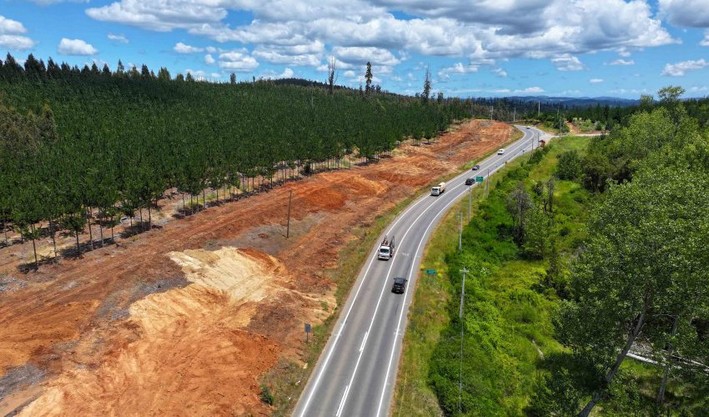The season coincides with the turnover of key positions ranging from the Governor's Office to municipalities, and even the regional directorate of CONAF.
The wildfire season in the Biobío Region is getting closer. In line with this, local authorities are currently working on various measures to prevent and combat these disasters.
However, this fire season, at least in the case of Biobío, will be handled by the new presidential delegate, Eduardo Pacheco, who took office less than two weeks ago; the new regional governor, Sergio Giacaman, who will assume the role of Gore starting January 6, 2025; and new mayors in various communes of the Region, who will take office on December 6 of this year.
Adding to this is the recent resignation of the regional director of the National Forestry Corporation (CONAF) in Biobío, Rodrigo Jara. It is worth noting that Jara served in the position for nearly three years after assuming office in April 2022.
Regarding the upcoming changes in various municipal administrations and the Gore Biobío, particularly the coordination required to face a wildfire season in the Region, the presidential delegate, Eduardo Pacheco, stated, "We will work until the last day of the current governor, Rodrigo Díaz, prioritizing the citizens' interests, which are the most important. Public institutions cannot stop for any reason."
Along the same lines, Pacheco added, "I had a conversation with the governor-elect, Sergio Giacaman. It was a very good discussion about various regional issues, but one of the priorities we established was this: coordinating emergencies and acting immediately."
For the representative of President Gabriel Boric in the area, it is crucial that during these transitions, there are no "periods of uncertainty" regarding the measures to be taken to prevent and combat fires in the Region.
"I see a very good willingness from him—Giacaman—to ensure continuity, so there are no periods of uncertainty for any reason, and that’s how we will proceed, also in collaboration with the mayors," said the delegate.
Another important aspect is that, given many mayors are newly appointed during the peak fire season, the presidential delegation has already begun assigning "liaison" seremis to improve coordination. At the same time, Pacheco acknowledged that once the new communal leaders take office, he will convene a regional preventive COGRID.
"Once the mayors take office, we will call for a regional preventive COGRID so that the mayors can quickly adapt to their crucial role in prevention and emergency response in each commune of the Region," the authority affirmed.
CONAF
Following Jara's resignation, Alberto Bordeu became the interim regional director of CONAF. When asked about the administrative changes and their potential impact on fire prevention and combat efforts, Bordeu noted, "Each municipality has its emergency departments with permanent staff. Even if new authorities appoint new heads for these departments, there is prior experience."
Similarly, the interim regional director of CONAF highlighted the training sessions established for newly elected authorities, as well as those remaining in their positions, across various communes in Biobío. Bordeu also pointed out that private companies have participated in these sessions to outline their operational capacity in firefighting.
"A workshop was held to clarify what we face in a wildfire season, the role of municipalities, and the role of the public apparatus. Private companies also participated, explaining their operational capacity and providing basic training so these new authorities understand what they will confront, allowing us to better handle the upcoming season," the interim director explained.
Regional Firebreak Plan
This Tuesday, the government unveiled the 2024-2025 Regional Firebreak Plan, which includes the execution of 670 kilometers of vegetation fuel removal, creating preventive firebreaks, fuelbreaks, and vegetation-free strips across various points in Biobío. The initiative is carried out through the Ministry of Public Works and CONAF.
Regarding the plan's progress, the MOP seremi in Biobío, Hugo Cautivo, stated, "There is a national plan that has been developed and is being implemented, with progress made over several months. Today, the Ministry of Public Works has advanced nearly 70% (300.5 km) of its commitment here, which totals 670 km, with 427 km assigned to us."
The MOP's goal is to complete all committed firebreak kilometers for the Region by December 31 of this year. However, Cautivo noted, "Weather conditions are variable, so we must maintain constant preventive action. In areas already cleared, we must review them, as recent rains may have caused new growth, requiring further cleanup."
Due to this, the seremi emphasized that this is part of ongoing preventive efforts carried out through global contracts, direct management, and the Concessions Directorate.
Cautivo also pointed out that, based on the major fires recorded in the summer of 2023, priority areas for firebreaks have been identified, including "Arauco Province, communes near Route P-20, the Contulmo and Curanilahue sectors along the Curanilahue-Nacimiento route. In Concepción Province, areas like Tomé, Rafael, Chiguayante, Hualqui, and the Nonguén Reserve are also key, along with the Ruta de la Madera, given its history and inherent risks due to nearby forest plantations."
In detail, the MOP is creating firebreaks at 43 points in the Region. Of these, 22 are in Biobío Province, in communes like Mulchén, Negrete, and Los Ángeles; 17 in Concepción Province, including Penco, Tomé, and Coronel.
Finally, four work sites are in Arauco Province, located in Arauco, Curanilahue, and Lebu.
Meanwhile, the presidential delegate did not rule out adjusting the government's deadline for completing all firebreaks in Biobío. "There is a schedule, but conditions have been changing. We’ve had rainfall until recently. (...) We’ll need to review the initial plan weekly due to weather conditions. Rainfall has persisted until very recently, and it’s not expected to end soon," he explained.
Source:Diario Concepción







Comentarios (0)
No hay comentarios aún. ¡Sé el primero en comentar!
Deja un comentario